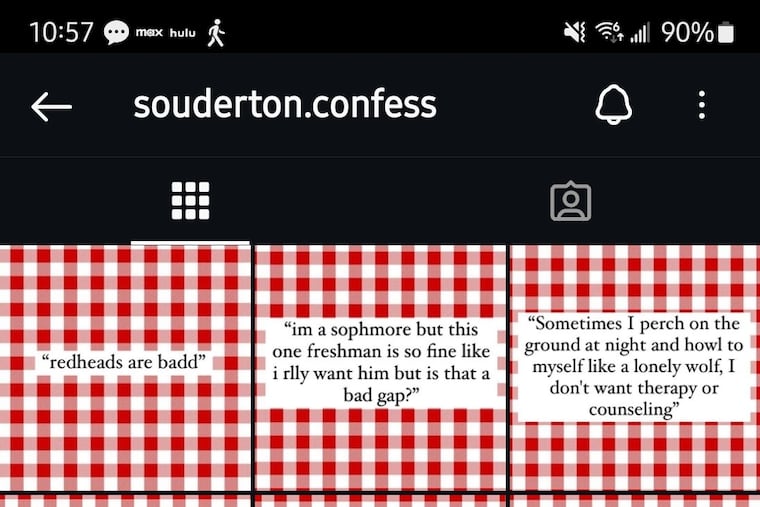Who’s behind Instagram posts targeting Souderton students? Officials are investigating ‘confessions’ accounts.
In a message to high school parents Thursday, Souderton Area High School Principal Sam Varano said there were “at least two” Instagram accounts used "to spread malicious rumors" about students.

Jennifer MacQueen’s daughter was bullied throughout her eighth-grade year in the Souderton Area School District. So when MacQueen heard from her daughter, now a ninth grader at Souderton Area High School, that she was being targeted on an Instagram account, she quickly took action.
The problem, MacQueen found, was proving who was responsible. After requesting to follow the private Instagram account, called souderton.confess, MacQueen found the post, which referred to a “trans freshman … i think has short black really curly hair been going into the girls bathroom and making out … and also she does drugs.” The post mirrored a bully’s previous comments accusing her daughter — who is gay — of being trans; when her daughter said she was gay, the student responded that “everyone who’s gay is a drug addict.”
But the Instagram account is anonymous — both in terms of its creator, and the “confessions” it posts, which can be anonymously submitted through a Google link. Among the posts shared with The Inquirer was a mix of seemingly silly comments along with some unnerving remarks: one referring to someone by their initials, saying he touched his brother’s genitals “and it turned him on”; another describes someone, possibly a teacher, as being “number 4 on my machete list.” A number of posts refer to students by their names, with crude or sexual references.
“Even the person running the page doesn’t necessarily know who’s sending them what’s being sent,” said MacQueen.
In a message to high school parents Thursday, Souderton Area High School Principal Sam Varano said there were “at least two” Instagram accounts recently used “to spread malicious rumors about students in our school.”
“We are working with law enforcement on this issue, and we believe we have identified the students involved in the creation of one of the accounts,” Varano said, adding the district was working to “make sure that these accounts are terminated as soon as possible,” and that students will face disciplinary actions.
The district’s superintendent, Frank Gallagher, said he couldn’t comment on how the district may have identified students involved in the accounts, citing the ongoing investigation.
Gallagher said the district is treating the postings as cyberbullying, which — even if it happens outside of school — can be regulated by the district “if it impacts what’s happening in school,” he said.
That’s a distinction that has increasingly challenged school administrators, who are trying to balance free speech rights with disruptions to the school environment. The Great Valley School District this summer faced pushback for its handling of 22 fake TikTok accounts created by middle schoolers impersonating teachers, including with sexual depictions; the district said the students’ conduct was protected by the First Amendment.
Gallagher said Souderton does have the authority to shut down the Instagram “confessions” accounts — which are part of a decadelong trend of social media accounts soliciting anonymous submissions about particular schools.
But “Meta” — Instagram’s parent company — “would have to intervene too,” Gallagher said. District officials say they have reached out to Meta.
As MacQueen scrolled through the postings last week, she was increasingly disturbed. One particularly worrisome post she saw said: “I be really nice but knowing that I like watching People die and imagining the most gruesome ways to die or way to get Killed.”
MacQueen reported posts to Safe2Say, Pennsylvania’s anonymous tip line for school threats, and was contacted by police.
“A lot of it is just a bunch of nonsense, but then sprinkled in is alarming stuff — weird, violent thoughts,” she said. She also met with school administrators, who told her they were trying to track IP addresses to identify students involved in the account, she said.
As for her daughter, MacQueen said, the student who bullied her last year said she hadn’t written the post. The anonymity makes it hard, MacQueen said, to hold anyone accountable.